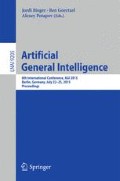Abstract
Cognitive modeling as a method has proven successful at reproducing and explaining human intelligent behavior in specific laboratory situations, but still struggles to produce more general intelligent capabilities. A promising strategy to address this weakness is the addition of large semantic resources to cognitive architectures. We are investigating the usefulness of this approach in the context of human behavior during software use. By adding world knowledge from a Wikipedia-based ontology to a model of human sequential behavior, we achieve quantitatively and qualitatively better fits to human data.The combination of model and ontology yields additional insights that cannot be explained by the model or the ontology alone.
Access this chapter
Tax calculation will be finalised at checkout
Purchases are for personal use only
Preview
Unable to display preview. Download preview PDF.
References
Altmann, E.M., Trafton, J.G.: Memory for goals: An activation-based model. Cognitive Science 26(1), 39–83 (2002)
Anderson, J.R., Bothell, D., Byrne, M.D., Douglass, S., Lebiere, C., Qin, Y.: An integrated theory of the mind. Psychological Review 111(4), 1036–1060 (2004)
Anderson, J.R., Lebiere, C.: The Newell test for a theory of cognition. Behavioral and Brain Sciences 26(05), 587–601 (2003)
Bates, D., Maechler, M., Bolker, B., Walker, S.: lme4: Linear mixed-effects models using Eigen and S4 (2013), r package version 1.0-5
Brysbaert, M., Buchmeier, M., Conrad, M., Jacobs, A.M., Bölte, J., Böhl, A.: The word frequency effect: A review of recent developments and implications for the choice of frequency estimates in German. Experimental Psychology 58(5), 412 (2011)
Douglass, S., Ball, J., Rodgers, S.: Large declarative memories in ACT-R. Tech. rep., Manchester, UK (2009)
Emond, B.: WN-LEXICAL: An ACT-R module built from the WordNet lexical database. In: Proceedings of the Seventh International Conference on Cognitive Modeling (2006)
Fellbaum, C.: Wordnet. In: Poli, R., Healy, M., Kameas, A. (eds.) Theory and Applications of Ontology: Computer Applications, pp. 231–243. Springer, Dordrecht (2010)
Fitts, P.M.: The information capacity of the human motor system in controlling the amplitude of movement. Journal of Experimental Psychology 47(6), 381–391 (1954)
Fu, W.T., Pirolli, P.: SNIF-ACT: A cognitive model of user navigation on the world wide web. Human-Computer Interaction 22, 355–412 (2007)
Halbrügge, M.: ACT-CV: Bridging the gap between cognitive models and the outer world. In: Brandenburg, E., Doria, L., Gross, A., Günzlera, T., Smieszek, H. (eds.) Grundlagen und Anwendungen der Mensch-Maschine-Interaktion, pp. 205–210. Universitätsverlag der TU Berlin, Berlin (2013)
Halbrügge, M., Quade, M., Engelbrecht, K.P.: A predictive model of human error based on user interface development models and a cognitive architecture. In: Taatgen, N.A., van Vugt, M.K., Borst, J.P., Mehlhorn, K. (eds.) Proceedings of the 13th International Conference on Cognitive Modeling, pp. 238–243. University of Groningen, Groningen (2015)
Laird, J.: The Soar cognitive architecture. MIT Press, Cambridge (2012)
Lehmann, J., Isele, R., Jakob, M., Jentzsch, A., Kontokostas, D., Mendes, P.N., Hellmann, S., Morsey, M., van Kleef, P., Auer, S., Bizer, C.: DBpedia - a large-scale, multilingual knowledge base extracted from wikipedia. Semantic Web Journal (2014)
Norman, D.A.: Slips of the mind and an outline for a theory of action. Tech. rep., Center for Human Information Processing, San Diego, CA (1979)
Oltramari, A., Lebiere, C.: Extending Cognitive Architectures with Semantic Resources. In: Schmidhuber, J., Thórisson, K.R., Looks, M. (eds.) AGI 2011. LNCS, vol. 6830, pp. 222–231. Springer, Heidelberg (2011)
Rasmussen, J.: Skills, rules, and knowledge; signals, signs, and symbols, and other distinctions in human performance models. IEEE Transactions on Systems, Man and Cybernetics 13, 257–266 (1983)
Reason, J.: Human Error. Cambridge University Press, New York (1990)
Salvucci, D.D.: Endowing a cognitive architecture with world knowledge. In: Bello, P., Guarini, M., McShane, M., Scassellati, B. (eds.) Proc. CogSci 2014, pp. 1353–1358 (2014)
Schultheis, H., Barkowsky, T., Bertel, S.: LTM C - an improved long-term memory for cognitive architectures. In: Proceedings of the Seventh International Conference on Cognitive Modeling, pp. 274–279 (2006)
Author information
Authors and Affiliations
Corresponding author
Editor information
Editors and Affiliations
Rights and permissions
Copyright information
© 2015 Springer International Publishing Switzerland
About this paper
Cite this paper
Halbrügge, M., Quade, M., Engelbrecht, KP. (2015). How Can Cognitive Modeling Benefit from Ontologies? Evidence from the HCI Domain. In: Bieger, J., Goertzel, B., Potapov, A. (eds) Artificial General Intelligence. AGI 2015. Lecture Notes in Computer Science(), vol 9205. Springer, Cham. https://doi.org/10.1007/978-3-319-21365-1_27
Download citation
DOI: https://doi.org/10.1007/978-3-319-21365-1_27
Published:
Publisher Name: Springer, Cham
Print ISBN: 978-3-319-21364-4
Online ISBN: 978-3-319-21365-1
eBook Packages: Computer ScienceComputer Science (R0)

